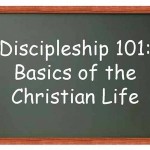Ten Things Every Christian Should Know
Keith at “subversive1” has post a wonderful series called “The Top 10 Things Every Christian Should Know.”
In reality, many of these things could be called “The top 10 things every Christian should re-learn.” Often, these are things that have been taught at a popular level or that have been assumed especially in a church culture.
I think most believers will find something challenging in Keith’s list. So, here are the “Top 10” in reverse order (10 down to 1):
10. The Christian sub-culture
9. The kingdom of God is NOT the American dream
8. Obedience to Jesus is not optional
7. “Work” is not a bad word
6. We ARE the church
5. Humility is essential
4. Salvation is a process, not a point in time
3. We are (not) called to judge (unbelievers)
2. Belief is not enough (or it’s not what you think it is)
1. The gospel is not about going to heaven when you die
Keith provides a detailed explanation of each item in his Top 10 list.
What do you think of Keith’s list?
Three Views on Christians and Horror: 1 – Christians are free to participate in horror genres
As I mentioned in the introduction to this series, I have invited three authors to write essays concerning this question: “Should Christians participate in the horror genres?”
I defined “participate” as follows: “We’re defining ‘participating in horror genres’ as reading/writing articles/stories/novels, watching shows/movies, viewing/creating websites, participating in forums, viewing/buying/creating art related to horror genres.”
Finally, instead of simply replying with “I agree” or “I disagree,” I encourage you to engage the authors by answering these three questions: 1) What is this author’s argument? 2) What are the strengths/weaknesses of the argument? 3) Is the argument persuasive/convincing? Why/Why not? Then, feel free to respond as you desire (within the realms of civility that I spelled out in the intro post).
This article was written by Lew. You can contact him at his website, on Facebook, or on Twitter.
——————————————–
Christians are free to participate in horror genres
In this essay I will discuss why Christians have freedom to participate in the horror genre. Apart from the obvious fact that there is nothing in scripture to preclude Christians from participating in the horror genre, I believe there are many reasons why Christians are free to do so and in many cases it may be beneficial for Christians to do so. But first, we need to discuss what horror actually is.
Merriam-Webster defines horror as:
1a: painful and intense fear, dread, or dismay
1b: intense aversion or repugnance
2a: the quality of inspiring horror : repulsive, horrible, or dismal quality or character
In this article, when I mention the horror genre, I am referring to that which produces an intense sense of “fear, dread, or dismay” in one’s own mind. Also, for this article, I am defining participate as the action of someone creating writings, movies, or verbal stories; as well as the action of someone reading, watching, and listening to those things that fall within the horror genre.
Horror can be used as a teaching tool
Over the centuries, the horror genre has been used in many ways. Some of the best horror stories have an underlying philosophy, morality, idea, or lesson that the story is trying to relay to it’s audience. Consider Frankensein, in this work Shelley is teaching her readers the conflict caused when man plays god by creating life, she also offers a glimpse into how she views society reacting to the strange and unknown. Some authors have written horror geared towards Christians, such as Frank Peretti’s This Present Darkness. Though This Present Darkness may not be wholly horror, I believe it definitely has aspects of it which fall into the definition of horror. Peretti is using his book to teach about the struggles we as Christians face in a day to day bases, while also showing the spiritual warfare going on in the background, hidden away where only spiritual eyes can see. Further, Tim LaHaye and Jerry Jenkin’s Left Behind series takes advantage of horror in many ways. Not only are they trying to explain their apocalyptic understanding of Revelation to Christians, but they are using their words to essentially scare people into seeking the cross.
Horror can be used as a warning
Have you ever read Hansel and Gretle to your children? This story purports that if you leave home, talk to strangers, and eat their candy, then there is a good chance you’re going to burn up in a furnace and die. This definitely falls into the horror category. Many children grow up with fables and fairy tales like this, many of which uses the horror to instill a sense of fear and dread in the child, to warn the child that doing a set of actions is either wrong or could get them in big trouble. In fact, if you have ever told your child that god will freeze their face if they are making funny/ugly faces, then you have participated in the horror genre, but in reality, you are warning them that what they are doing is unacceptable and if they continue to do it, there will be consequences.
God uses Horror
If you search for Horror in the scriptures, you will see it mentioned over and over again. The word occurs over 29 times in the NASB. Many of these verses are talking about how an entity either is an object of horror or will experience horror in the future. There are some interesting things we can glean from some of these verses.
For instance, in Deuteronomy 28:37 we read, “You shall become a horror, a proverb, and a taunt among all the people where the lord drives you.” My first reaction to this verse was simple, there isn’t anything redeemable about this verse to support my argument. Then it struck me, god is lumping horror in with proverbs and taunts. Most likely because both proverbs and taunts are used as teaching tools and warnings. More importantly, though god is not condoning the use of the horror genre here, this verse does tell us that he knows people will use horror and is telling them that they will become a horror story. With this verse alone, one could argue that horror is an acceptable genre. There are similar verses found in 2 Chronicles 30:7, Jeremiah 42:18, Ezekiel 5:15, and many more like those.
We can also find examples in scripture where God uses horror in our lives. For instance, god uses horror in Genesis 2:17 when he tells Adam and Eve that they will die if they eat the fruit from the tree of knowledge of good and evil. God uses horror in Genesis 6, when he says that he will bring a flood to destroy everything and everyone and again in Genesis 19 when he destroys the city of Sodom. In Exodus, god used horror when dealing with the Egyptians who refused to free his chosen people. God uses horror in dreams to get people to react a certain way. In one of the most amazing books of the Old Testament, god sends Jonah to warn Nineveh of their impending desctruction, if they do not change their ways. They repent and god does not destroy them.
The Horror of the Cross
Have you ever thought about what Jesus went through during his crucifixion? Imagine watching, in real life, a man who you believe is your savior being tied up and nailed to a cross, hanging there blood and sweat pouring down his face and body — your god, defeated, hanging on for dear life. As Christians, we buy paintings of this scene, hang crosses and crucifixes in our homes, teach our children about his sacrifice, and focus on it ever Easter. What Jesus did for us on the cross, though it was horrific, was the greatest news for us. His sacrifice is why we can call ourselves Christ Followers.
As Isaiah horribly prophecizes, “Surely our griefs He Himself bore, And our sorrows He carried; Yet we ourselves esteemed Him stricken, Smitten of God, and afflicted. But He was pierced through for our transgressions, He was crushed for our iniquities; The chastening for our well-being fell upon Him, And by His scourging we are healed.” (Isaiah 53:4-5)
Are Christians free to participate in the horror genre? For our sake, I hope so.
But…
There are many verses than have been used against the idea that Christians are free to participate in horror. Many of them presuppose that ‘horror’ is evil and thus their arguments become circular, but some of these verses still need to be taken into consideration. The most powerful of these verses comes from Philippians 4:8, “Finally, brethren, whatever is true, whatever is honorable, whatever is right, whatever is pure, whatever is lovely, whatever is of good repute, if there is any excellence and if anything worthy of praise, dwell on these things.”
We must ask ourselves, is the horror genre…
- true?
- honorable?
- right?
- lovely?
- of good repute?
- excellent?
- worthy of praise?
When I consider these questions, I find myself comparing my answers to the horror we already find in scripture. Horror can reveal truth, honor, and righteousness; horror can encourage us to appreciate things that are lovely and show us the things that are of good repute; horror can produce excellence within us and allow us to see those things that are worthy of praise. Just as Job’s horror brought some of these things, even to us, I believe other horror can do the same and has already. There may be some completely unredeemable horror out there, but there is definitely some out there that is beneficial to both those who follow Christ and those who are yet to follow Christ.
(This post and the other posts in the series will also be published at “Zombie Theology.”)
Christians and Horror
Second Generation Disciples and the Gentiles in Acts 11
As you probably know (if you’ve read my blog over the last few weeks) our church is studying the Book of Acts together. Last Sunday, we discussed Acts 11, where Peter reports about his encounter with the gentile Cornelius and his family and friends… and the Holy Spirit.
Perhaps the most important verse in that chapter is this one: “When they heard these things they fell silent. And they glorified God, saying, “Then to the Gentiles also God has granted repentance that leads to life.” (Acts 11:18 ESV)
The “they” in that passage refers (at least) to “the circumcision party”, a faction of disciples of Jesus who were upset that Peter had associated with (even ate with) Gentiles. (See Acts 11:2-4.)
The “these things” in that passage is Peter’s report concerning God choosing the Gentiles for salvation and demonstrating that through the work of the Holy Spirit. (See Acts 11:15-17.)
However, there is another very interesting passage immediately following that one. In fact, I almost read over it without noticing it. Here it is:
Now those who were scattered because of the persecution that arose over Stephen traveled as far as Phoenicia and Cyprus and Antioch, speaking the word to no one except Jews. But there were some of them, men of Cyprus and Cyrene, who on coming to Antioch spoke to the Hellenists(1 )also, preaching the Lord Jesus. (Acts 11:19-20 ESV)
“Those who were scattered” seems to point back to disciples of Jesus who had originally been from Jerusalem. For example, Luke had earlier said this about this same group of believers:
And there arose on that day a great persecution against the church in Jerusalem, and they were all scattered throughout the regions of Judea and Samaria, except the apostles. Devout men buried Stephen and made great lamentation over him. But Saul was ravaging the church, and entering house after house, he dragged off men and women and committed them to prison. Now those who were scattered went about preaching the word. (Acts 8:1b-4 ESV)
Now, we don’t know if “those who were scattered” represent first generation disciples (i.e., those who had physically been with Jesus, including the 120 mentioned in Acts 1:15) or if they followed Jesus because of the witness of other disciples (i.e., such as those who were “added” later as reported in Acts 2:41, Acts 2:47, and Acts 5:14).
However, as Luke tells us in Acts 8:1-4 (above), “those who were scattered” (who were not among The Twelve) proclaimed the good news of Jesus Christ with Jews that they met in Judea and Samaria (following Jesus’ prediction/command in Acts 1:8).
Then, at some point, “those who were scattered” continued moving north out of the Judea/Samaria regions. By the time we get to Acts 11:19, “those who were scattered” (from Jerusalem) had reached Phoenicia, Cyprus, and Antioch.
Whether or not “those who were scattered” knew what God had done that day in the house of Cornelius, we are not told explicitly. But, we are told that while “those who were scattered” were traveling farther from Jerusalem and into more Gentile territory, they continued to proclaim the gospel to Jews only.
Then, another generation of disciples came on the scene. These are disciples who heard the message of the gospel proclaimed by “those who were scattered.” They are described as people from Cyprus and Cyrene. When they came to Antioch, they did something still considered outrageous by “those who were scattered” (at least, they would have considered it outrageous if we consider their action).
These second generation (at least) disciples began proclaiming the good news of Jesus Christ to Gentiles – that is, to people from nations other than Israel… to people who were not ethnic Jews.
Once again, we see God using The Twelve to introduce a work (i.e., salvation offered to the Gentiles), but using others (who were not numbered among The Twelve) to expand it.
Looking back at Acts 1:8 (“But you will receive power when the Holy Spirit has come upon you, and you will be my witnesses in Jerusalem and in all Judea and Samaria, and to the end of the earth.”), I think it’s safe to say that Luke did not consider Jesus’ words to apply only to The Twelve, or only to those who heard the words. Instead, Luke paints the picture of a church in which every believer understood himself or herself to be a witness of Jesus Christ.
Three Views on Christians and Horror: Introduction
(This post in the introduction to a series called “Three Views on Christians and Horror.” I introduced the concept of this series previously in a post called “Four Views: Christians Participating in Horror Genres.” No one wanted to write an essay defending one of the four views, so we changed the series to “Three Views.”)
Psycho, Nosferatu, Alien, Night of the Living Dead, The Shining, The Thing, The Exorcist, Dawn of the Dead, A Nightmare on Elm Street.
What do these movies have in common? Beyond being considered some of the best horror movies ever made, they’re also often included in lists of the best movies ever made of any genre.
One look at the upcoming novels, movies, and television shows will tell you that our culture’s love of the various horror genres has not waned in recent years… perhaps it is even growing.
So, what does that mean for Christians? Should Christians stay completely away from the horror genres? Can Christians participate in the horror genres but only in a peripheral sense? Are Christians free to participate in the horror genres however they desire?
As a reminder, I previously defined Christians “participating” in horror genres as follows: “We’re defining ‘participating in horror genres’ as reading/writing articles/stories/novels, watching shows/movies, viewing/creating websites, participating in forums, viewing/buying/creating art related to horror genres.”
Over the next three days, I will publish one post per day answering the question, “Should Christians participate in horror genres?” The posts will follow the same order that I originally listed them in the concept post (link above):
- Christians are free to participate in horror genres.
- Christians can participate in horror genres with some limitations (defined by the author, but not evangelism as a limitation – see below).
- Christians should never participate in horror genres.
As with all of my posts and “guest blogger” posts, I encourage discussion and dialog. However, I do ask that you be considerate of the other people who are reading and interacting on this series. Obviously, there will be disagreement. But, we must keep our disagreement civil. Always treat the other person with the same respect and dignity with which you would desire to be treated. (For the most part, I do not think this warning is necessary for the people who read my blog.)
Also, remember that there will be both Christians and nonChristians reading these posts. We encourage interaction from both groups as well as from Christians with differing viewpoints.
For those who are Christians, remember that we remain part of the same family in Christ in spite of our disagreements.
Finally, I want to thank the authors who wrote the three essays for us. They are presenting their views on a debated issue. I appreciate their hard work and their concern for other Christians and for those who are not Christians.
I hope you enjoy this series as much as I have.
(This post and the other posts in the series will also be published at “Zombie Theology.”)
Christians and Horror
A change in diet and exercise for me… and for the church
Last week, I went to the doctor for a physical checkup. I did not feel bad; I didn’t have any symptomatic issues. But, it was time for a physical.
The doctor examined me thoroughly and did not find any external issues. But, when he started talking internal issues – minute issues actually – he said that he found problems. While I was not having any outward physical symptoms, he said there were some internal indicators (from the blood work) that things were not going as they should be.
Some of the test when combined with one another, showed that I was headed toward heart problems if something didn’t change. So, what needed to change? Well, I could change by taking medicine. But, that’s not what the doctor recommended.
You see, the problem is that my body was not working the way it should be working. Oh, all of the parts were working fine, but together, it was not functioning as a body is supposed to function. A body is designed to work – exert – exercise. But my job is extremely sedentary. (Well, my fingers get a workout, but that’s about it.) This type of sedentary lifestyle is not healthy.
Also, he said that the things I was putting into my body were not the things that my body needs. I was eating plenty of food, but I was not eating the right kinds of food. And, the kind of growth caused by this food was not the kind of growth that was healthy.
So, the doctor recommended (instead of medication) changing my diet and exercise so that they were both more in line with the way my body is designed. That makes sense to me, and so for the last few days, we have changed our diet, and we have begun exercising.
One night, while I was walking and thinking about the conversation with my doctor and our changes in diet and exercise, I realize that my predicament is very similar to what is happening (or not happening) among the church – at least from my personal experience, from what I’ve studied, and from what I’ve read about.
Today, the church – like my body – is not healthy, although at the surface there may be few – if any – symptoms. The problem is that we are often measuring the wrong things. We are seeing “growth”, but not the kind of growth that the church was designed for. In fact, much of the church’s “growth” today is actually at the expense of other parts of the church.
Similarly, while on the outside we may see huge numbers and overflowing bank accounts (although this is changing now, isn’t it?), when we look closer – looking into the details of people’s lives – we find indicators that something is wrong.
Then, when we compare the church today to the way the church was designed to function (as described in the New Testament, for example), we see drastic differences.
Most people – not all, but most – would agree with what I’ve said about the church so far. However, many would suggest that the church needs medicine – something added from the outside.
Perhaps, instead, the church simply needs a change in diet in exercise. Perhaps the church simply needs to take in the kinds of things we were designed for, and we need to work in ways that we were designed to work.
Now, of course, even if I’m right, we must decide what diet and exercise is good for the church…
What do you think?
Church Life in Christ: It’s all Connected
Five years ago, when I started this blog, I started it for a very specific reason: to study the purpose of the assembling of the church according to the New Testament. For that reason, I named the blog “The Assembling of the Church.” I was about to begin PhD studies (on the same topic), and I wanted this blog to be a place where I could write about and discuss my studies.
Over the years, I’ve learned something else very important: you cannot ONLY study the assembly of the church. Why? Because when it comes to our life together in Christ, it is all interconnected.
You see, we like to compartmentalize things, especially when we try to study them. Look at school subjects, even beginning with kindergarten and elementary school. There are times for specific activities and exercises and subjects.
Nothing changes when we get into the realm of theology – the study and understanding of God. We humans like to divide subject into smaller compartments (theology proper, Christology, Pneumatology, Anthropology, Ecclesiology etc.) and attempt to study just that one compartment or even a subset of that one compartment. For example, my particular topic of interest would be a subset of Ecclesiology, right? Well, yes. But it is also a subset of theology proper, Christology, Pneumatology, Anthropology, etc. Again, it is all interconnected.
Even when we think of ideas and topics and concepts that seem to relate only to Ecclesiology, we find they are truly interconnected within the topic of the church and also connected to the other areas of theology as well.
For example, I cannot study the purpose of the church assembling together in the New Testament without consider how that relates to Scripture, theology proper (God), Christology (Jesus Christ), Pneumatology (the Holy Spirit), Anthropology (mankind), etc.
Within the topic of ecclesiology, I cannot study the reason for Christians gathering together without also considering spiritual gifts (the reasons for them, the exercise of them, the extent of them, etc.), leadership (the nature of leadership and maturity among the church), our identity (both related to Christ and to one another), service (or “ministry” if you prefer), missions, etc. All of these topics are interrelated.
But, they are not only interconnected in our study; they are also interconnected in our life.
The way we meet together tells us a lot about what we think about God, Scripture, Jesus Christ, the Holy Spirit, mankind, the church, etc. Also, the way we meet together tells us a lot about what we think about spiritual gifts, leadership, our identity, service, missions, etc.
The opposite is true also. What we truly believe about the items listed above: God, Scripture, Jesus Christ, … spiritual gifts, leadership, identity… will affect the way we meet together.
Similarly, all of the things listed above cannot be separated from the way that we live our lives together. The way we share (or do not share) our lives together says a lot about what we believe, and vice versa.
It really is interconnected. As much as we try, we cannot separate them cleanly… and perhaps we shouldn’t try. Because when we separate them, we may find that we begin saying one thing while living a completely different way.
And, we must always remember… following Christ is a way of life, not a list of concepts.
What do you think?
Church: Impossible
When I look at the church today, as we typically see it in the west (especially in the USA), and then when I look at the church as it is described in the New Testament, one word comes to mind: impossible.
Can you imagine the modern church relying on the service of the entire body for teaching, serving, proclaiming the gospel, caring for the sick, etc. instead of relying primarily on the work of trained leaders? That seems impossible to me.
What about the leaders themselves? Can you imagine the church recognizing leaders as those from among the church (people they actually know and have lived with) – people who are already serving and teaching and living as an example of a disciple of Jesus Christ? Can you image the church no longer asking for resumes and hiring strangers to be their leaders? Again, it seems impossible.
Then, there’s mission… Can you imagine churches sending out people from among their ranks – yes, normal, everyday believers – and helping them travel from place to place so they can proclaim the gospel and build up believers that they meet? Can you imagine them doing this without relying on trained and salaried professional missionaries? Impossible.
Then, when the church meets… Can you imagine the whole church coming together to build up one another through the gifts and through their own study? Can you imagine anyone being allowed to speak or serve as God directs them? Can you imagine a church meeting where the leaders are not emphasized or don’t take the prominent position? Is that impossible?
Like I said, when I compare the church today to the church described in the New Testament, I tend to think, “Impossible.”
I mean, we know how to plan meetings. We know how to train and pay professional ministers and missionaries. We know how to rely on our education and methods and formulas. We know how to allow our leaders to do the work.
But, to actually rely on God to work through each part of the body the way the Scriptures describe… impossible.
Yep, impossible. Unless, of course, God desires to work that way…
Reducing discipleship to a series of classes
In the Gospels, Jesus called people to follow him. They spent time with him, ate with him, watched and listened as he talked with and taught others, observed his miracles and concern for others, and were witnesses of his death, burial, and resurrection. He called these people his disciples, and one of Jesus’ last commands to them was for them to “make disciples.”
When Paul sent a letter of encouragement to his “son”, Timothy, he reminded Timothy of his teaching along with his way of life. As Paul said elsewhere, he followed Jesus Christ, and then challenged others to imitate his example of following Christ.
In the New Testament, being a disciple means following Jesus. While it certainly includes learning certain information (facts) about Jesus, learning facts does not make someone a disciple.
Today, Christians often reduce discipleship to a series of classes or lessons. Churches develop discipleship programs and enroll as many people as possible into these classes. While instruction and classes can help a Christian understand Scripture, they are not a replacement for following Jesus and being his disciple.
Paul reminded Timothy of something very important in his second letter:
You, however, have followed my teaching, my conduct, my aim in life, my faith, my patience, my love, my steadfastness, 11my persecutions and sufferings that happened to me at Antioch, at Iconium, and at Lystra — which persecutions I endured; yet from them all the Lord rescued me. (2 Timothy 3:10-11 ESV)
Timothy had spent much time traveling with his mentor. He not only heard Paul teach, he also saw Paul’s way of life. Timothy saw how Paul dealt with trials and struggles. He knew why Paul traveled from city to city and joyfully faced such persecution. Timothy was discipled by Paul by sharing Paul’s life – both the good and the bad – and through that, Paul was able to help Timothy follow Jesus as his disciple.
In order to disciple one another today, Christians must begin by sharing their lives with one another. They must be willing to live openly and honestly, showing others the good and the bad – the beautiful and the ugly – parts of their life.
Only by sharing our lives with one another can we begin to help one another be disciples of Jesus Christ. Classes can never do this.
Red, White, and Blue… and Jesus, too
Yeah, I know… everybody and their sister (in the USA) is writing a post about Independence Day. Not the movie… the patriotic holiday. The day that the USA celebrates it’s rebellion from… I mean, independence from England.
No, I’m not anti-American. Not at all. I’m very grateful to God that I was born in the country in which I have many personal freedoms. But, I’m also tired of the church in the USA confusing patriotism with following Jesus.
I haven’t traveled out of the USA much. But, I’ve traveled (and read) enough to know that God blesses many people in many different countries. Yes, sometimes the people in those countries have less personal freedoms, but, for the church, that’s not always a bad thing.
I’ve talked to too many Christians in the USA who were more concerned with the individual rights (life, liberty, and the pursuit of happiness is guaranteed by God in the Bible, right?), and much less concerned with giving up their rights (much less their life) for the sake of others. To be completely honest… I have been numbered among those as well.
But, spending time with believers in Nicaragua and Ethiopia has opened my eyes to a new set of rights that God truly bestows on all his children. No, I’m not talking about the right to life, liberty, and the pursuit of happiness. I’m talking about death, service, and pursuit of others to show them the love of God.
Yes, many people died to guarantee certain political, social, cultural, and even religious freedoms. Like I said, I’m grateful for those freedoms, and I pray that I take advantage of them in the service of my God.
However, those freedoms cannot (and must not) stand between me and showing the love of God to others through word and through deed. And I mean that the existence OR lack of those freedoms must never stand between me and showing the love of God to others through word and through deed.
Citizens of the United States of America definitely have more individual freedom than citizens of other countries of the world. However, these freedoms are not based on our relationship with God. Those freedoms are granted to Christian citizens and to nonChristian citizens. Yes, Christians died defending those freedoms, but so did nonChristians.
So, while I am truly grateful for the freedoms that I have as a citizen of the United States of America, I refuse to recognize myself and other citizens as honored higher by God simply because of our citizenship.
Similarly, I refuse to speak or to write about God’s view of America and Americans in a way that I could not also speak of Nicaragua, Ethiopia, China, Afghanistan, Iraq, or any other country in the world.
The United States of America is not God’s country. Citizens of the United States who have received the good news of Jesus Christ and have been indwelled by the Spirit of God are God’s people. But, citizens of other countries who have received the good news of Jesus Christ and have been indwelled by the Spirit of God are God’s people also.
Titus 2 in Action!
I love the picture of “doctrine” that Paul paints for us in Titus 2. Yes, Paul calls it doctrine in Titus 2:1 – “But as for you, teach what accords with sound doctrine.”
Yesterday, I read a post by a friend of mine. This post reminded me of part of Titus 2.
The post was written by my friend Meagan for the site “Prayer of Hannah” and was called “Why I love having a ‘mother’s helper’.”
Now, you should know that both Meagan and Lindsay (the teenage girl that Meagan talks about in her post) are part of the church that we meet with. So, you could say that I have a ring-side seat to the relationship that Meagan writes about.
But, as I read Meagan’s post, I couldn’t help but think about this passage (even though she doesn’t mention it):
Older women likewise are to be reverent in behavior, not slanderers or slaves to much wine. They are to teach what is good, and so train the young women to love their husbands and children, to be self-controlled, pure, working at home, kind, and submissive to their own husbands, that the word of God may not be reviled. (Titus 2:3-5 ESV)
I’m not going to give away anything that Meagan writes, so jump over to her post and read it.
After you read it, ask yourself if you are investing your life into the lives of others the way that Meagan and Lindsay are. If not… get started!









